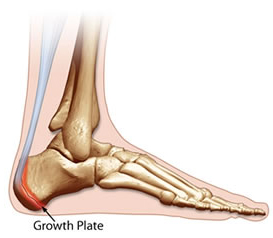Indoors and outdoors, youth athletes stay active throughout the year in competitive sports, and for many of them, heel pain has become “just another part of the game.” We advise our patients that heel pain can be a warning sign of a serious foot problem and should be evaluated promptly.

Heel Pain frequently occurs in children ages 6 to 14 as their feet grow and the heel bone develops. This condition is called Calcaneal Apophysitis.
As children become more active in sports, they increase their risk for growth plate injuries and subsequent heel pain. Heel pain frequently occurs in children ages 6 to 14 as their feet grow and the heel bone develops. This condition is called Sever’s disease or Calcaneal Apophysitis. With Calcaneal Apophysitis, bone forms in an area behind the heel, known as the growth plate, and cartilage is vulnerable to severe inflammation from strain or stress. With repeated stresses and strains from over-activity, the heel becomes painful.
Even though growth plate trauma is the leading cause of heel pain in young people, the condition can be difficult to diagnose. We caution that parents should be concerned if a child has pain in the back or bottom of the heel, limps, walks on the toes, or seems to have difficulty participating in normal recreational activities. The condition is diagnosed by a thorough examination of the child’s feet and legs and possibly medical imaging tests to rule out other serious causes of heel pain, such as bursitis, tendonitis, and fractures.
In most cases, mild or moderate heel pain can be treated successfully with shoe inserts to soften the impact on the heel, anti-inflammatory medications, stretching, and physical therapy. In severe cases, a medical provider will immobilize the foot and ankle in a cast, and, in rare instances, surgery may be necessary.
Heel pain in young people often returns after treatment because the growth plate is still forming until 14 or 15 years old. Choosing well-constructed shoes with good support and restricting the use of spiked athletic shoes (especially on hard fields) can lower the risk of injury. I also advise that young athletes avoid competition that exceeds their physical abilities.
About Mark Birmingham, DPM
Podiatry at Boulder Medical Center
 Mark Birmingham, DPM, is a board-certified Doctor of Podiatric Medicine. DPMs are qualified by their education and training to evaluate and treat conditions affecting the foot, ankle, and related structures of the leg.
Mark Birmingham, DPM, is a board-certified Doctor of Podiatric Medicine. DPMs are qualified by their education and training to evaluate and treat conditions affecting the foot, ankle, and related structures of the leg.
Dr. Birmingham offers clinical, arthroscopy, and surgical expertise for general foot and ankle care, sports injuries, complex deformities, chronic ankle instability, fractures, arthritis, and more.
Resources
- Contact Dr. Birmingham
- Call for an appointment: 303-440-3036

